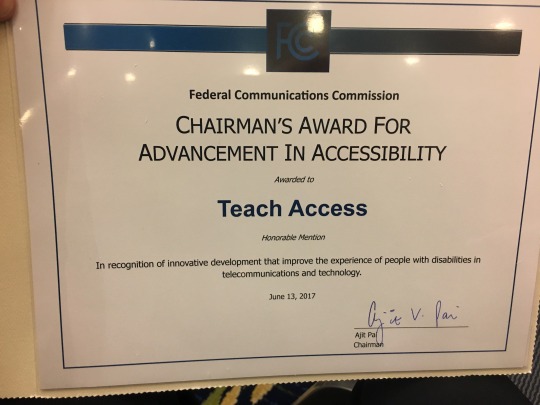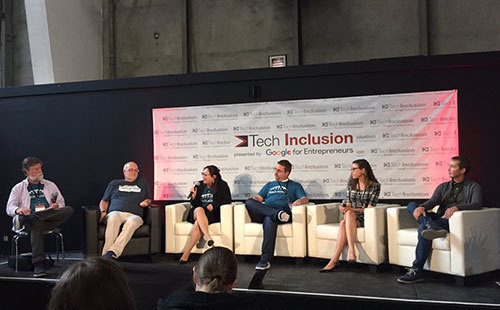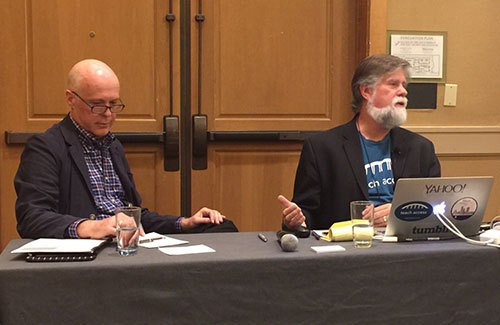#teach access
Mike Shebanek, Yahoo Senior Director of Accessibility
I’m very pleased to share that last night, Teach Access, an initiative to include accessibility and universal design principles in the curricula of computer scientists, designers and researchers in undergraduate, graduate and continuing education, was awarded an Honorable Mention Chairman’s Award for Advancement in Accessibility (Chairman’s AAA) by the Federal Communications Commission.
The Chairman’s AAA is an FCC program recognizing products, services, standards and other innovative developments that improve the experience of people with disabilities in telecommunications and technology. Yahoo is a founding partner of Teach Access, which was awarded this honor for its ambitious mission of incorporating fundamental concepts about accessible design and development across undergraduate design, computer science, UX and related curricula.

Image: Teach Access logo
Teach Access was created by a coalition of tech companies, universities and advocates for people with disabilities. Its mission is to expand awareness and knowledge of accessible technology development in higher education through approaches such as faculty bootcamps, guest lectures, internships, challenge grants for research and curriculum development and industry partnerships. Teach Access also builds open source online learning tools that reflect and teach accessibility best practices.

Image: Chairman’s award for advancement in accessibility certificate
Congrats to the entire Teach Access team! To learn more about Teach Access and all the wonderful things we’re doing, please visit our site.
By Larry Goldberg, Director of Accessible Media
Teach Access, the industry-academia collaboration founded by Yahoo, Facebook and two dozen other industry and higher ed organizations, has been busy. We’ve been on the road spreading the word about the need to make accessible design and development fundamental to college students in computer science, design and related fields. The mission of making technology pervasively accessible starts with making sure all college students in tech-related fields understand, at a minimum, the fundamental concepts of making tech work for people of all abilities.

Above photo: Larry Goldberg of Yahoo, Ted Drake of Intuit, Amy Chen of Adobe, Mike Shebanek of Yahoo, Laura Palmaro of Google, and Jeff Wieland of Facebook representing Teach Access during a panel session at the Tech Inclusion conference.
On October 26, we hosted a panel at the Tech Inclusion conference in San Francisco. I moderated the panel and our friends from Facebook, Adobe, Google and Intuit joined our own Mike Shebanek for a deep dive into the why and how of Teach Access for an audience of start-ups, long-standing companies, students and hiring managers, all gathered to learn how the diversity movement needs to be inclusive of people with disabilities.

Above photo: Larry Goldberg of Yahoo, Matt Huenerfauth of RIT, Bruce Walker of Georgia Tech leading a panel session at the Disability and Inclusive Technology summit at the White House.
Then, on November 7, the White House hosted the Disability and Inclusive Technology Summit where Teach Access was presented by RIT’s Matt Huenerfauth and Georgia Tech’s Bruce Walker with me as the moderator. Many in the audience of policymakers, major corporations and advocates for people with disabilities responded in agreement that Teach Access’ mission was the best way forward to assure that future technologies are “born accessible” rather than retro-fitted for accessibility after release. Shadi Abou-Zahra from the W3C attended and filed this report.

Above photo: Prof. Dave Chesney of the University of Michigan and Larry Goldberg of Yahoo at the Accessing Higher Ground Conference
On November 16 and 17, Teach Access continued spreading the word at the Accessing Higher Ground Conference near Denver, Colorado. Professor Dave Chesney form the University of Michigan and I sat down to discuss Teach Access with a gathering of 500 university-based accessibility professionals, campus leaders and solution providers in the field. Dave’s presentation, “Building Accessibility into a Computer Science Capstone Course,” was a highlight of the week, demonstrating practical methods of teaching accessibility in a mainstream computer science course at a major university. I also had the opportunity to present the project at a lunch time plenary session entitled, “Sorting Out Certifications for Accessibility Professionals, Application Designers & Developers.” I couldn’t be more excited by the positive response to Teach Access and the commitment of its members.
Stay tuned to this space for continued updates throughout this and the upcoming year.
